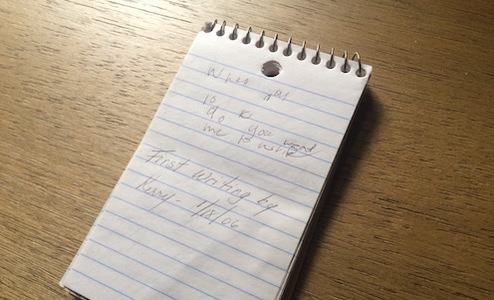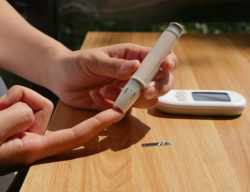Before I had a stroke at 28 from hormonal birth control (you can read my story here), I didn’t really know what a stroke was. And I certainly didn’t understand the implications or ramifications of what it meant to have an “insult to the brain.”
I knew I had physical and mental limitations, that I needed to learn how to walk again, to put on my socks, to bathe myself. But they also told my family that I may have an entirely different personality. Can you imagine? You wake up one day, have a brain injury, and your personality is completely different? And would you be able to recognize how your own personality had changed or would it be something people would whisper about when they thought you weren’t listening? My sister must have been particularly worried about my personality. I remember one morning she had to butter my biscuit for me after I had tried unsuccessfully several times. “I’ll butter your biscuit for you for the rest of your life,” she said. “I’m just so glad you’re still in there.” At least most of me was. That is to say, I still had my struggles with who I was and who I had been. But really, who doesn’t?
The interesting thing about surviving a stroke is learning what you can and cannot do. To others, even others that are informed about brain injuries, you may look so similar to your pre-stroke self that they take for granted you are the same. But you may not be.
So as a public service announcement for Stroke Awareness Month, here is a list of 5 things not to say to a person who has had a stroke (or any brain injury).
1. “Hold this.”
The disconnect between mind and body when you have a traumatic brain injury is a constant surprise. The first time they handed me the receiver to talk on the telephone, I held it backwards. One time I put a Cheeto in my ear instead of my mouth. When my mother asked me if I wanted to put on some lipstick, I took the tube from her, put it on my lips (or near them), then put the cap back on the raised stick of lipstick, crushing it. In the ICU, when they had me brush my teeth and rinse with a paper cup of water, the nurse instructed me to spit the dirty water back in the cup. I nodded. “Of course,” I thought. Then I promptly swallowed it. One of the most surprising things, and this was long after I’d been discharged from the hospital (and if I’m being completely honest, even now sometimes), is how things get lost in my left hand. I can literally be holding my keys in my left hand and be looking around the house for them.
But it’s not just the things in my left hand. Sometimes I will stand before a trash can with a pen in one hand and a tissue in the other and tell myself, “throw away the tissue, throw away the tissue, throw away the tissue.” Then I always have to bend down and pick the pen out of the trash.
2. “Lift your leg.”
During my rehabilitation, I was a bit of a challenge for my therapists. Most stroke survivors have damage to either the right or the left side of the body. But the damage from my stroke went down both sides of my brain and consequently affected my left arm and my right leg. One of the exercises the physical therapist asked me to do was to raise my left arm while all on all fours. I did. Then he asked me to raise my right leg. I did. “Raise your right leg,” he said again. So I raised it again. “Kerry, raise your right leg,” he said, like I might not have realized he was talking to me. “Right leg. Right leg,” my mom added. “I am raising my right leg,” I said, exasperated. What is wrong with them? I wondered. I looked behind me with complete certainty that I would see my leg raised. Of course I didn’t, but I did catch an expression on my mom’s face. It was the same expression she was wearing when we played Boggle in recreational therapy and I only found a few words. It was the same expression she wore when I smashed her tube of lipstick. It was an expression that seemed to say she wasn’t quite sure who I was.
3. “Write this down.”
A day or two after I got out of ICU, my mom asked me if I thought I could still write. You would think after the sock incident, I might have had my doubts. But I’m clearly a slow learner, because I said, “Sure, I can.” She handed me a notebook and a pen. I recently found that notebook, the picture is above. (My mom would continue to lovingly document these little milestones, just like she had when I was a baby.) When I wrote that, I thought I had done a pretty good job. And considering what my brain had been through, it was amazing I could even hold a pen. But when I look at it now, it breaks my heart a little bit. I’m so lucky that I write flawlessly now. Just kidding! My writing, while mostly legible and mostly on the lines of the paper, is still a mess. Until a few weeks ago, I didn’t even realize that messing up every third word, leaving letters out, adding letters where they don’t belong—that isn’t just how everyone writes. After a highly scientific study of asking a few of my friends, it seems that’s not normal. The first paper I wrote in graduate school, I typed the words male and female as “mail” and “femail.” Every. Single. Time. Even when I would remind myself, it still came out wrong. To this day, I have trouble with homonyms but I usually catch the mistake before I send the email or publish the story. But sometimes I don’t. I hope you’ll bare with me… haha.
4. Glare at them when they park in a handicapped spot.
In fairness, glaring at someone is not saying anything to them, but so much of communication is nonverbal that I had to include it. After my stroke, they gave me a temporary handicapped decal for my car. And while I may have looked relatively normal, I assure you I was not. I couldn’t walk long distances. I found any remotely crowded place to be extremely stressful. I had to sit down halfway through a trip to the grocery store. Day-to-day things that used to be easy were difficult and frustrating. But even more frustrating were the looks that people would give me when we parked in handicapped parking. One woman glared at me in such obvious disgust as we got into our car. She waited to comment until we had closed our doors so I didn’t hear what she said, but I’m pretty sure she heard me when I rolled down my window. As my husband sped quickly out of the parking lot, I hung my head out of the car and yelled, “I had a stroke!” at the top of my lungs. Not one of my finer moments, to be sure. The lesson that remains, and one even I frequently have to remind myself of, is that you really never know what a person is going through just by looking at them.
5. “My (insert friend or relative)’s experience was much worse than yours.”
A few months after I got out of the hospital, I was at dinner with friends when a woman I had just met (a friend of a friend) was surprised to learn that I had recently had a stroke. “My grandfather just had a stroke,” she said excitedly. “But his was way worse than yours. He’s still in the hospital.” Of course, what she meant was that I looked like I was fully recovered while he was still having visible problems. And of course, she probably didn’t mean to be dismissive. But it really bothered me. I had a massive stroke. I didn’t just have blood clots in my brain (an ischemic stroke, which accounts for 87% of all strokes). I also had bleeding in my brain (a hemorrhagic stroke—a much less common and far more deadly stroke). In my mind, I had actually survived two strokes. Yes, I was extremely lucky and I know my recovery was nothing short of miraculous. But that didn’t negate what happened to me nor what I was continuing to deal with. This woman knew nothing of my struggle to get to dinner that night, nor the struggle of the months before (and certainly not of the subsequent years), yet she made a value judgment on what had happened to me based on her grandfather’s experience. As human beings, it’s natural for us to draw comparisons and to find patterns. After all, common experiences and sharing stories are the major ways we connect to one another. And when you are interacting with someone who has had a traumatic brain injury, or any health crisis, it is completely fine to ask questions. But then just try to listen.
If you’ve ever had a health crisis, and many of us have, what have people unwittingly said to you? Or have you ever put your foot in your mouth when dealing with a friend or loved one’s health crisis? I know I have! Leave your answers in the comment section below.
Real Risk Study: Birth Control and Blood Clots
Lucine Health Sciences and Hormones Matter are conducting research to investigate the relationship between hormonal birth control and blood clots. If you or a loved one have suffered from a blood clot while using hormonal birth control, please consider participating. We are also looking for participants who have been using hormonal birth control for at least one year and have NOT had a blood clot, as well as women who have NEVER used hormonal birth control. For more information or to participate, click here.











